

Encyclopedia of Alabama. Symposium by Plato. Concerning the things about which you ask to be informed I believe that I am not ill-prepared with an answer.
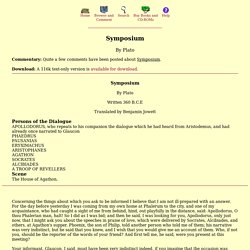
Why Does the U.S. Military Celebrate White Supremacy? The white supremacist who murdered nine black churchgoers in Charleston, S.C., five years ago dispensed with the fiction that the Confederate battle flag was an innocuous symbol of “Southern pride.”
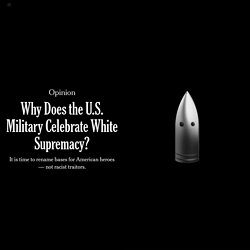
A murderer’s manifesto describing the killings as the start of a race war — combined with photos of the killer brandishing a pistol and a rebel flag — made it impossible to ignore the connection between Confederate ideology and a blood-drenched tradition of racial terrorism that dates back to the mid-19th century in the American South.
This same toxic legacy clings to the 10 United States military installations across the South that were named for Confederate Army officers during the first half of the 20th century. (1857) Frederick Douglass, “If There Is No Struggle, There Is No Progress” Peoples Temple Collection; Box 25, Virtual Item 10, Q932- Sermon in Redwood Valley. The 1619 Project. In August of 1619, a ship appeared on this horizon, near Point Comfort, a coastal port in the English colony of Virginia.
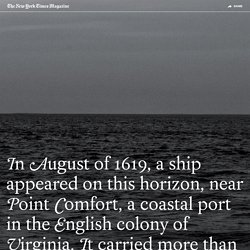
It carried more than 20 enslaved Africans, who were sold to the colonists. No aspect of the country that would be formed here has been untouched by the years of slavery that followed. On the 400th anniversary of this fateful moment, it is finally time to tell our story truthfully. The 1619 ProjectThe 1619 Project is an ongoing initiative from The New York Times Magazine that began in August 2019, the 400th anniversary of the beginning of American slavery. It aims to reframe the country’s history by placing the consequences of slavery and the contributions of black Americans at the very center of our national narrative. A Most American Terrorist: The Making Of Dylann Roof. “What are you?”
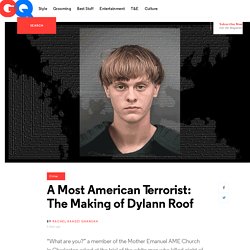
A member of the Mother Emanuel AME Church in Charleston asked at the trial of the white man who killed eight of her fellow black parishioners and their pastor. “What kind of subhuman miscreant could commit such evil?... What happened to you, Dylann?” Rachel Kaadzi Ghansah spent months in South Carolina searching for an answer to those questions—speaking with Roof’s mother, father, friends, former teachers, and victims’ family members, all in an effort to unlock what went into creating one of the coldest killers of our time.
Executive Director of NY Tech Meetup (NYTM) Jessica Lawrence is the Executive Director of NY Tech Meetup (NYTM), the largest Meetup in the world and a non-profit organization supporting New York’s growing technology community.

NYTM’s goal is to build a sustainable and diverse technology industry that drives economic growth, leads innovation, and creates positive, high-impact change. The organization’s perennially sold-out monthly events have served as a springboard for hundreds of the city’s technology start-ups from Tumblr to Foursquare to Livestream. What I Learned From Breaking the Law. The Raines family in Michigan, August 1969 (Photo courtesy of 1971) Editor’s Note: This lecture, given to the Society of Christian Ethics on January 10, 2015, is reprinted with the permission of the author.
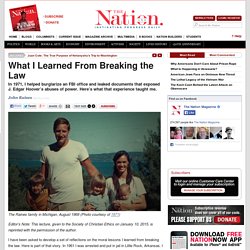
I have been asked to develop a set of reflections on the moral lessons I learned from breaking the law. Here is part of that story. In 1961 I was arrested and put in jail in Little Rock, Arkansas. I was a “freedom rider.” 1) Law is not to be trusted without interrogating its complicity with privilege and power.2) Identity is morally problematic, especially if you get yourself born a white male of class privilege.3) A nation that lets itself be governed by fear will become a poorly governed nation.4) The arrogance of power contributes to its own demise when confronted by persistent resistance, and finally….5) I learned that the anger called hope can overcome despair, create a community of resistance and build a future that seemed impossible.
Richard Nixon and the Oobie-Doobie Girl. Richard Nixon and the Oobie-Doobie Girl On January 28, 1972, the White House gave a dinner in honor of the founders of Reader's Digest.
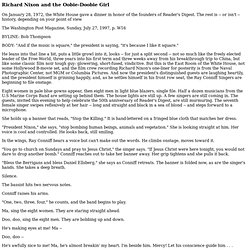
The rest is -- or isn't -- history, depending on your point of view The Washington Post Magazine, Sunday, July 27, 1997, p. Einstein belief in god childish. Why I Am Not A Christian, by Bertrand Russell. Introductory note: Russell delivered this lecture on March 6, 1927 to the National Secular Society, South London Branch, at Battersea Town Hall.
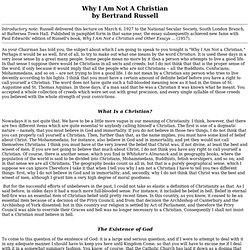
Published in pamphlet form in that same year, the essay subsequently achieved new fame with Paul Edwards' edition of Russell's book, Why I Am Not a Christian and Other Essays ... (1957). As your Chairman has told you, the subject about which I am going to speak to you tonight is "Why I Am Not a Christian. " Perhaps it would be as well, first of all, to try to make out what one means by the word Christian. It is used these days in a very loose sense by a great many people.
Some people mean no more by it than a person who attempts to live a good life. Quote by David Foster Wallace: “The so-called ‘psychotically depressed’ person ...” Reality Denial: Steven Pinker’s Apologetics for Western-Imperial Violence. By Edward S.
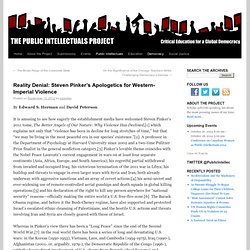
Herman and David Peterson Whereas in Pinker’s view there has been a “Long Peace” since the end of the Second World War,[7] in the real world there has been a series of long and devastating U.S. wars: in the Koreas (1950-1953), Vietnam, Laos, and Cambodia (1954-1975), Iraq (1990-), Afghanistan (2001- or, arguably, 1979-), the Democratic Republic of the Congo (1996-), with the heavy direct involvement of U.S. clients from Rwanda (Paul Kagame) and Uganda (Yoweri Museveni) in large-scale Congo killings; and Israel’s outbursts in Lebanon (1982 and 2006), to name a few. There were also very deadly wars in Iran, invaded by Saddam Hussein’s Iraq (1980-1988), with Western encouragement and support.
And with the stimulus-excuse of 9/11, the U.S. political and “defense” establishment was able to declare a global “War on Terror,” open-ended and still ongoing, to assure that the “Long Peace” would not be interrupted by a conflict that met the Pinkerian standards for a real war. On Liberty: Edward Snowden and top writers on what freedom means to them. Shami Chakrabarti Writers have always been a big part of Liberty.
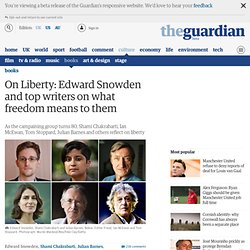
Since our very beginnings, as the National Council for Civil Liberties (NCCL) in 1934, they've played a key role in our battle to protect civil liberties and promote human rights in Britain. HG Wells, Vera Brittain, EM Forster, AA Milne, George Orwell and Aldous Huxley are just a few of the authors who supported Liberty in the early years – and perhaps it's not surprising that those who write feel a special affinity with Liberty's values and ideals. Now on Monday we will celebrate 80 years of "the fight that is never done". Letter To Old Slave Master, Jourdon Anderson. It's business that really rules us now.
It's the reason for the collapse of democratic choice. It's the source of our growing disillusionment with politics. It's the great unmentionable. Corporate power. The media will scarcely whisper its name. It is howlingly absent from parliamentary debates. The political role of business corporations is generally interpreted as that of lobbyists, seeking to influence government policy. Your Lifestyle Has Already Been Designed. Well I’m in the working world again. I’ve found myself a well-paying gig in the engineering industry, and life finally feels like it’s returning to normal after my nine months of traveling. Because I had been living quite a different lifestyle while I was away, this sudden transition to 9-to-5 existence has exposed something about it that I overlooked before. Since the moment I was offered the job, I’ve been markedly more careless with my money. Not stupid, just a little quick to pull out my wallet. Wall Street Owns The Country. Surveillaince, and the construction of a terror state.
Statement by Julian Assange after One Year in Ecuadorian Embassy. (on 2013-06-22) It has now been a year since I entered this embassy and sought refuge from persecution. As a result of that decision, I have been able to work in relative safety from a US espionage investigation. But today, Edward Snowden’s ordeal is just beginning. Two dangerous runaway processes have taken root in the last decade, with fatal consequences for democracy. Government secrecy has been expanding on a terrific scale. Simultaneously, human privacy has been secretly eradicated. Assange Statement on the First Day of Manning Trial.
(on 2013-06-04) Statement by Julian Assange As I type these lines, on June 3, 2013, Private First Class Bradley Edward Manning is being tried in a sequestered room at Fort Meade, Maryland, for the alleged crime of telling the truth. The court martial of the most prominent political prisoner in modern US history has now, finally, begun. It has been three years. Bradley Manning, then 22 years old, was arrested in Baghdad on May 26, 2010. "For me, I stopped keeping track," he told the court last November. Whiteness and the 99% An Interview with Computing Pioneer Alan Kay. Born in 1940, computer scientist Alan Curtis Kay is one of a handful of visionaries most responsible for the concepts which have propelled personal computing forward over the past thirty years — and surely the most quotable one.
He’s the man who said that “The best way to predict the future is to invent it” and that “Technology is anything that wasn’t around when you were born” and that “If you don’t fail at least 90 percent of the time, you’re not aiming high enough.” And when I first saw Microsoft’s Surface tablet last June, a Kay maxim helped me understand it: “People who are really serious about software should make their own hardware.” Quote of the day: Walter Kaufmann # 2. Is this the condition that I feared seneca. Why Don’t I Criticize Israel? AUDIO TRANSCRIPT [Note: This is a verbatim transcript of a spoken podcast. However, I have added notes like this one to clarify controversial points. Religion, Reason and the source of ethical authority – Opinion – ABC Religion & Ethics. Many people believe, with Dostoyevsky's Ivan Karamazov, that if ethical precepts were not grounded in God's commands, then anything would be permitted.
Burma-Shave. Soldier's inhumane imprisonment.